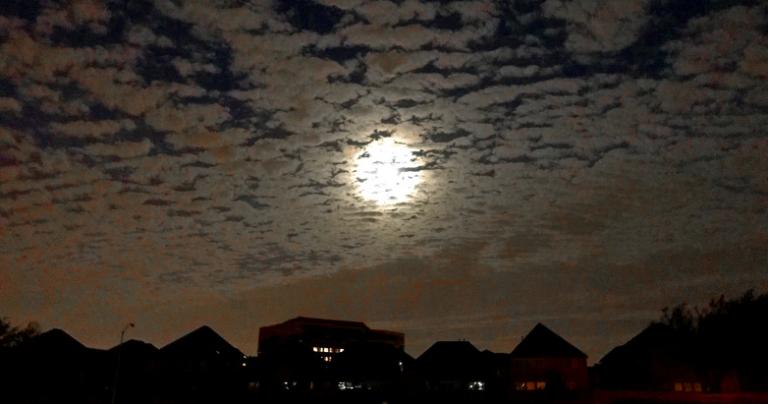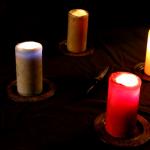Most of my writing here concerns Paganism, polytheism, and Druidry, but I am a committed Unitarian Universalist as well. UUs generally don’t share my beliefs, but they share my values. They are my friends and allies and I am happy to gather with them on Sunday mornings… at least when my Pagan work doesn’t have me out of town or up all night on Saturday.
I serve on the Worship Committee at Denton UU and today I was responsible for the Chalice Lighting, the ritual act that opens all UU services. Since this month’s service theme is courage, I chose a reading from Christian theologian Paul Tillich. In the first chapter of The Courage to Be (1952), Tillich wrote:
Courage is an ethical reality, but it is rooted in the whole breadth of human existence and ultimately in the structure of being itself… Courage can show us what being is, and being can show us what courage is.
Tillich finds the ultimate roots of courage and of being in “the God above God.” If I had found Tillich when I was nine or ten years old and was being force-fed Charles Spurgeon and Dwight Moody I might still be a Christian.
Is that the Forest God I hear laughing in the background? Probably. In any case, this post isn’t about Paul Tillich or Christianity. It’s about finding the courage to follow what your intuition and your experiences of life are telling you is true, even when the mainstream world insists they can’t possibly be true.
The cost of conformity is your soul
The loudest religious voices in this country scream that there is only one God. They’re so certain of this they feel entitled to pass laws forcing everyone to conform to what they think that God wants.
The second loudest voices in this country scream that there are no Gods. They’re so certain of this they ridicule anyone who holds beliefs and practices that have been helpful to humanity for thousands of years. They question the sanity of anyone who talks of deep spiritual experiences, some going so far as to suggest those with such experiences should be institutionalized.
That leaves those of us with first-hand experiences of Gods and spirits in between the proverbial rock and hard place. No one is rounding us up like Daesh does with anyone who isn’t their brand of Muslim, they’re just sending constant signals that we’re wrong and possibly dangerous, to ourselves if not to society. And so we second-guess ourselves, we rationalize our experiences away, and we miss an opportunity to enrich and transform our lives.
The pressure to conform is immense.
The cost of conformity is your soul.
The inherent uncertainty of life
For all that life is beautiful and joyous, it is also difficult and extremely random. The human desire for certainty is great, and understandable. That doesn’t mean we can achieve it with any degree of reliability.
Christian fundamentalists base their certainty on a literal reading of the Bible, while ignoring historical and literary evidence that clearly shows such a reading is at best unwise. Atheist fundamentalists base their certainty on a narrow reading of science, ignoring evidence they don’t like and forgetting that absence of evidence is not evidence of absence.
(To my atheist friends: if your honest examination of the available evidence leads you to conclude there are no Gods, spirits, or magic, know that I respect your beliefs. You are welcome in the Pagan community and in my public rituals, and I support your right to advocate for your beliefs. But I will not agree to naturalism as the least common denominator of Paganism, and I will not cease in my efforts to encourage people to interpret their religious experiences in a straightforward manner even (especially) when that leads them to a conclusion you believe is impossible.)
How many Gods are there? Zero? One? Many? What happens after death? What is the purpose of life? Is there a purpose? These are deep and meaningful questions that humans have contemplated for at least as long as we’ve been human. They have no certain answers – nothing can be proved with any reasonable degree of certainty.
This doesn’t mean you’re free to believe anything you want. Some things are demonstrably false. The Earth is not flat. Humans cannot fly without mechanical assistance. Other things, while theoretically possible, are highly unlikely: pick your conspiracy theory of choice.
But since so much of life is uncertain – especially the Big Questions of Life – why not follow your own intuition? Be guided by wise people of all ages, be guided by tradition, and be guided by new discoveries… including new discoveries of old traditions. But listen to what your heart and your head tell you is true and see where it takes you.
Following your own intuition requires courage: courage to start and even more courage to stay the course.
The proof is in the living
No one wants to live a lie. No one wants to live in self-delusion. But in the words of psychonaut Terence McKenna “if it’s real it can take the pressure.”
Does it work? Does it make your life deeper and more meaningful? Does it help you form and maintain reciprocal relationships across communities and across realms? Does it help you deal with the Big Questions of Life, including your own mortality?
If it holds up, if it’s helpful, then it’s real.
Of course, your intuition may not lead where you think you want to go. It took years and years for me to realize I didn’t really want what the mainstream world said I was supposed to want. Then I thought I wanted to be a witch, shaping reality in conformance to my will. Never thought I’d end up as a Druid and priest whose practice is far more devotional than operational. But that’s where my intuition has led me.
It’s holding up. It’s helpful.
It’s real.
The courage to be
I read Paul Tillich’s The Courage to Be fairly early in the “get serious” stage of my Pagan journey, when I was trying to overcome my fundamentalist upbringing and build a solid religious foundation for my Pagan studies. For that purpose it was quite good – it helped me learn that not all Christians were fundamentalists. But like the most helpful book from that era of my life (The Power of Myth by Joseph Campbell), I have issues with it today. Tillich calls for transcending “the God of theism” in favor of “the God above God” who is so far above humans as to be unrelatable.
As a devoted follower of the many Gods of theism, I find this approach unsatisfactory. But Tillich’s work can still be useful in part, in particular the opening quote on courage.
If we have the courage to follow our intuition, we will explore our religious experiences in depth and see where they lead. This will stimulate further and deeper experiences. Contemplation of these deeper experiences will give us insight into the very nature of being… or at least it has for me.
Insight into being shows us the difference between the reality we see with our own eyes and the “consensus reality” we are pressured to accept, and shows us that our courage was both justified and necessary. This increases our courage to engage even more intimately with our experiences, beginning the process over again in a virtuous circle of ever-increasing depth and meaning.
Courage can show us what being is, and being can show us what courage is.
Including the courage to follow your intuition.

















